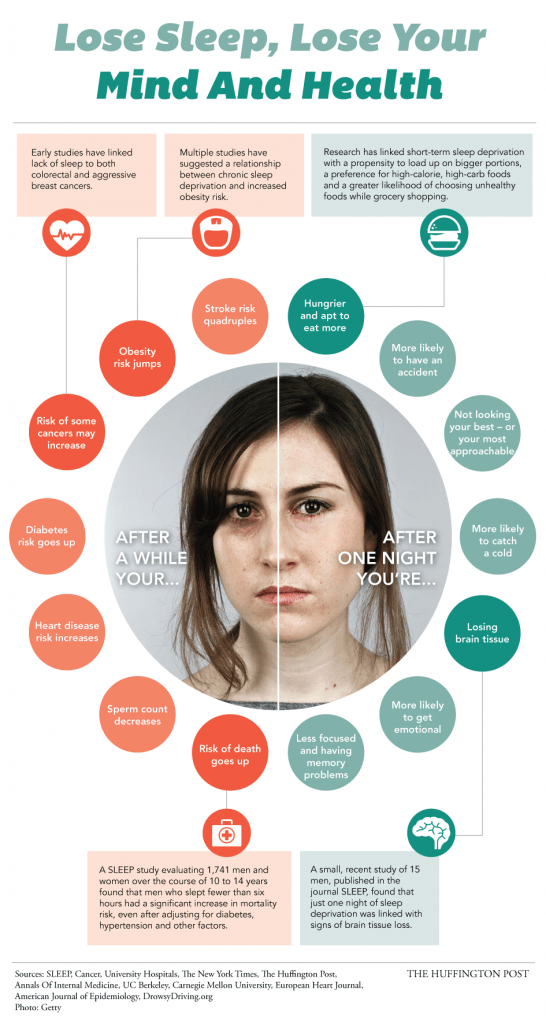By: Amanda Froelich,
You had a late night – it happens to everyone! But two or three nights a week, what effect does that have on your body? According to a report shared by HuffPost, more than you might think.
Results from a study published in PNAS confirmed that just one week of sleeping fewer than six hours per night can lead to serious health issues, including the modification of over 700 genes. Symptoms of deprivation can also result in anything from bloodshot eyes to a quadrupled risk of stroke.
The infograhic designed by HuffPost’s Alissa Scheller explains:

To function properly, human beings need at least 7 to 9 hours of sleep per night each week, but just 59% of American adults ever get that (as surveyed by Gallup in 2013). That’s a big decrease from the 84% in 1942. And 14% said they got five or fewer. That lack of snooze time can seriously endanger health and well-being in most people.
According to the CDC, the trend of insufficient sleep is an “epidemic,” with a survey conducted by the agency finding 35.3% of people get less than 7 hours of sleep per night on average. Surprisingly, 37.9% reported feeling sleepy enough to doze during the day in the past month, and an unnerving 4.7% admitted to sleeping at the wheel of a car.
We are a nation obsessed with convenience and fast-paced living, but it’s an obsession that is resulting in many health issues.
WebMD claims that lack of sleep can result in accidents, lower one’s intelligence, numb the sex drive, impair memory, and also contribute to depression and weight gain. And a survey in 2005 of 10,000 adults between the ages of 32 and 49 found that those who slept less than seven hours a night were significantly more likely to be obese. In addition, research published in the Journal of Neuroscience found that prolonged wakefulness permanently damaged locus ceruleus brain cells responsible for keeping mice awake and alert.
Lead study author Sigrid Veasey, MD of the University of Pennsylvania commented, “We now have evidence that sleep loss can lead to irreversible injury. This might be in a simple animal, but this suggests to us that we are going to have to look very carefully in humans.”
“We’re shifting to a 24-hour-a-day, seven-day-a-week society, and as a result we’re increasingly not sleeping like we used to,” told University of British Columbia’s Najib T. Ayas to the Washington Post. “We’re really only now starting to understand how that is affecting health, and it appears to be significant.”
And former Bellevue Hospital Sleep Disorders Center Director Dr. Joyce Walseban added to the topic, stating “Mood and sleep use the same neurotransmitters. It’s very hard to tell if someone has sleep loss or depression.”
It’s quite clear: lack of sleep is a big issue that deserves attention. Now citizens need to make time for it. As the average American watches 4-6 hours of television per day, it really just comes down to prioritizing.
The CDC recommends that people time their sleep requirements according to the following chart:

Although there is no “magic number, as individual sleep needs vary,” these estimates give a healthy range of what one should aim for in their nightly rest.
Source:


